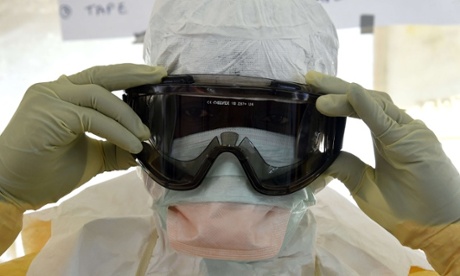Ernest Bai Koroma writes to Tony Abbott to ask for medical personnel and engineering expertise to help build wards

The president of Sierra Leone has sent a personal plea to Australia to send medical and engineering assistance to help the country deal with the outbreak of Ebola in the country.
Ernest Bai Koroma wrote a letter to Tony Abbott, dated 18 September, which asks for specific help to deal with the “outbreak of this dreadful disease”, which has caused more than 3,300 deaths in west Africa.
Koroma’s letter reportedly admits that Sierra Leone’s health system is “overwhelmed” by the disease, with the president requesting “military health units, logisticians and engineers” to help isolate and treat infected people.
Noting the Australian humanitarian response to typhoon Haiyan in the Philippines, Koroma states: “If the Australian military is able to help build and operate even three 100-bed isolation facilities in Sierra Leone, your government will save potentially thousands of lives by removing patients from communities where they are infecting their relatives and neighbours.”
On Thursday, Australia’s foreign affairs minister, Julie Bishop, announced a further $10m in aid to fight the Ebola outbreak, bringing Australia’s total assistance to $18m.
However, the government has so far declined to send health workers to west Africa, citing the risk of them contracting the disease. This stance has been criticised by aid organisations Save the Children and Médicins Sans Frontières.
On Friday, the ABC reported that a Tasmanian man who had lost eight relatives to the Ebola virus was organising a shipment of medical equipment to Sierra Leone.
Isaiah Lahai, who moved to Tasmania in 2006 after spending 14 years in African refugee camps, has assembled a batch of medical protective gear to be sent from Sydney to Sierra Leone.
“There is a very serious need for food, there is need for infrastructure and development and a whole lot of other things, so at the moment we are open to any support we can get,” he said. “Australia should send doctors that are qualified, doctors that are actually able to put the Ebola outbreak under control.
“If we do not do something now Ebola outbreak is going to be a global epidemic.”
Responding to the suggestion by the Australian Medical Association that Australia could do more, Bishop said the government’s first responsibility was to ensure the disease did not spread to Australia.
“If [Australian health workers] are working in West Africa we need an evacuation plan in place,” she told the ABC. “We do not have a credible evacuation plan that would be able to get Australian health workers back to Australia. That is the expert advice of our military and our health department.
“The AMA agrees that we don’t have the aeroplane and we don’t have the capacity to get people back to Australia.
“We have been discussing with other countries located geographically much closer to west Africa as to whether or not Australian health workers could be evacuated to their countries. At this time we have no guarantees from any other country.”
So far, the US has deployed 3,000 troops to help deal with the Ebola outbreak, while Britain is spending $185m on targeted aid. The UN has said a further $54m is required over the next four weeks to help deliver treatment.
